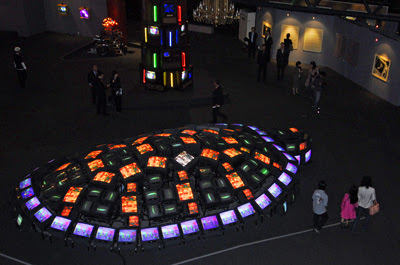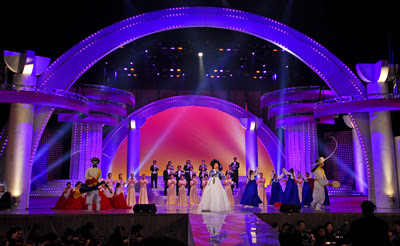Rhapsody in video
Yesterday evening, after the conclusion of the first day of a conference I was attending in Seoul, our hosts took us to an art exhibition by the famous Korean ‘video artist’, the late Nam June Paik. I’d heard of his work before, but never seen any of it, so didn’t know quite what to expect. The exhibits comprised ‘works of art’ either made out of TV monitors, or displays inside TV monitors. The reaction of the delegates was interesting. They ranged from: “What an exquisite exhibition – this is so avant garde” to “What a childish load of rubbish – how can they call this art” (I suppose those making the former comments would call those making the latter comments something like ‘Philistines’). Some of the delegates in the former category spent ages admiring each exhibit from different angles, whilst those in the latter category retired to the snack bar or went outside for a smoke (one sat on the stairs reading a book, looking most uninterested).
I can’t make up my mind which category I fall in. I am still not sure whether I liked the exhibition or not. I have difficulty in calling it ‘art’ but would not disagree with calling it ‘artistic’. One very impressive exhibit was a 10 metre long turtle in the centre of the exhibition hall, made out of 166 TV sets.

I was told the turtle was ‘created’ in Germany in 1993 and was on loan to the exhibition. I suppose it was dismantled in Germany and the TV sets shipped to Korea in boxes, and then reassembled again, so on that basis I do have difficulty in describing this as ‘art’ (especially as the artist is no longer alive, so he wouldn’t be the one doing the reassembling). And I suppose when the exhibition is over, they will pack the TV sets back into their boxes, send them back to Germany, and whoever owns it there will have to reassemble it again. I wonder how the artist would feel about his ‘work of art’ being dismantled and reassembled all the time.
After the art exhibition we attended an excellent concert of both traditional and modern Korean music and song, but it was the Korean opera sets that were performed by Kim Yeong Im and the Incheon Opera Chorus that were most inspiring. There was a full orchestra in the pit (and a very flamboyant conductor) and the overall production was world class.

A most enjoyable evening (although I am still scratching my head about the ‘art’ exhibition).
I can’t make up my mind which category I fall in. I am still not sure whether I liked the exhibition or not. I have difficulty in calling it ‘art’ but would not disagree with calling it ‘artistic’. One very impressive exhibit was a 10 metre long turtle in the centre of the exhibition hall, made out of 166 TV sets.

I was told the turtle was ‘created’ in Germany in 1993 and was on loan to the exhibition. I suppose it was dismantled in Germany and the TV sets shipped to Korea in boxes, and then reassembled again, so on that basis I do have difficulty in describing this as ‘art’ (especially as the artist is no longer alive, so he wouldn’t be the one doing the reassembling). And I suppose when the exhibition is over, they will pack the TV sets back into their boxes, send them back to Germany, and whoever owns it there will have to reassemble it again. I wonder how the artist would feel about his ‘work of art’ being dismantled and reassembled all the time.
After the art exhibition we attended an excellent concert of both traditional and modern Korean music and song, but it was the Korean opera sets that were performed by Kim Yeong Im and the Incheon Opera Chorus that were most inspiring. There was a full orchestra in the pit (and a very flamboyant conductor) and the overall production was world class.

A most enjoyable evening (although I am still scratching my head about the ‘art’ exhibition).